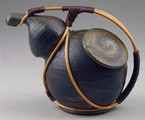
 |
Richard Bresnahan American, Teapot 1995 Stoneware with natural glazes 6-3/4 inches high, 8 inches long 96.25.2a,b |
Look
- What is this object? How can you tell? What would this object be used
for? What material is this teapot made of? What makes you think so?
What material is the teapot's handle made of? Why do you think the teapot's
handle isn't made of clay?
- What kinds of lines do you see in this teapot? Are the lines straight
or curved? Thick or thin? Use your finger to trace the lines in the
air. What kind of movement does your hand make? What mood or feeling
does the movement of the lines help create? Why do you think the artist
used so many curved lines in this teapot?
- What shapes do you find in this teapot? Are they ORGANIC
or GEOMETRIC
shapes? Are all the shapes the same size? How do the shapes the artist
used relate to the function of the object? Is this teapot SYMMETRICAL
or ASYMMETRICAL?
Explain your answer.
- What is texture? How do you think this teapot would feel if you touched
it?
- The teapot was fired in the Tanegashima, or third and largest chamber,
of a special wood-firing kiln. The pottery here is unglazed. Do the
colors look natural or artificial? What makes you think so? Would the
teapot look different if it had been glazed with colors? How?
- Do you think this teapot was made (a) on a potter's wheel, (b) using
the coil method, (c) with a mold, or (d) by the slab method. Explain
your answer.
Think
- Do you think this teapot was made to be used or to be displayed? Why?
Do you think an object can be used daily and still be considered an
art object? Look around your classroom. Name several objects that are
useful. Think of the objects you have at home that are useful. If you
could make any object in your classroom or home decorative, which object
would you choose? Why? How would you change it to make it decorative?
- Do you have a teapot at home? Is your teapot made of clay or some
other material? Was it made by hand? Where was it made? What other beverages
do people drink today? What kinds of containers hold these beverages?
What kinds of containers do you and your family use to keep liquids
in? What are your containers made of?
- Where does clay come from? The artist who made this teapot is committed
to using resources and recycled materials from the surrounding area.
He respects the earth and is thankful for its many gifts. Are there
any gifts of the earth for which you are thankful? What are they? How
do you show your appreciation for the earth?
- Richard Bresnahan, the artist, makes pottery that incorporates American
and Japanese traditions. He is an American who studied pottery in Japan
for four years. Was this teapot made a few years ago or a long time
ago? Why do you think so?
- Have you ever made anything from clay? What did you make? How did
you do it? This teapot was thrown on a potter's wheel. Have you ever
used a potter's wheel?
- Would you like to use this teapot? Do you think it would be heavy?
What sounds would you hear as you poured the tea?
![]()
Key ideas.
Where does it come from?
What does it look like?
How was it used?
How was it made?
Discussion questions.
Additional resources.
Select another piece.